The Greek God Zeus: The Insatiable Womanizer of Mount Olympus
“Then Zeus no longer held back his might; but straight his heart was filled with fury and he showed forth all his strength. From Heaven and from Olympus he came forthwith, hurling his lightning: the bolts flew thick and fast from his strong hand together with thunder and lightning, whirling an awesome flame.” (The Theogony of Hesiod, ll. 687-712)
The most memorable of the deities of Greek mythology , Zeus was the Greek god of lightning, thunder, the sky, law, order and justice, as well as being the king of the gods from his throne on Mount Olympus. In this role, he acted as their all-knowing ruler, ensuring they fulfilled their role, managing the frequent conflicts that ensued. He also loved to meddle in the lives of mere mortals, and had passionate affairs with many gods and mortal women.
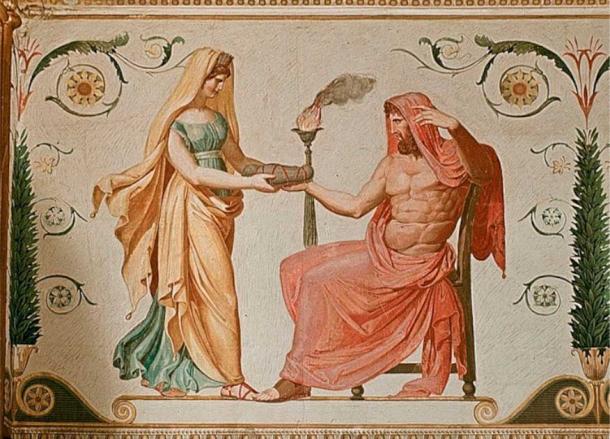
Rhea giving Cronos a stone, disguised as the infant Greek god Zeus. (Public domain)
The Birth of a Greek God: Zeus
A version of the story of Zeus’ birth can be found in Hesiod’s Theogony. In this ancient Greek poem, Zeus is said to be the youngest child of Cronus and Rhea. His five older siblings (Hestia, Demeter, Hera, Hades, and Poseidon) were swallowed by their father as soon as they were born, as Cronus was aware that one of his children was destined to overthrow him and take his place as the king of the gods.
Zeus, however, escaped the fate of his siblings through deception. Instead of handing the infant over to her husband, Rhea decided to give Cronus a stone wrapped in cloth, which he swallowed. Rhea then hid her son in a cave (either on Mount Ida or Mount Dikteon), on the island of Crete.
Zeus was therefore raised in secret by a foster-mother. In several versions, Zeus’ foster-mother is said to be a goat named Amalthea. In order to cover up the baby’s cries, a group of Kourete dancers made noise and clapped their hands in order to protect the infant Greek god Zeus. Other versions claim that Zeus was raised by Gaia, or by one of the nymphs. In Metamorphoses, Rhea gave birth within a cave and Zeus was nursed by sacred bees.
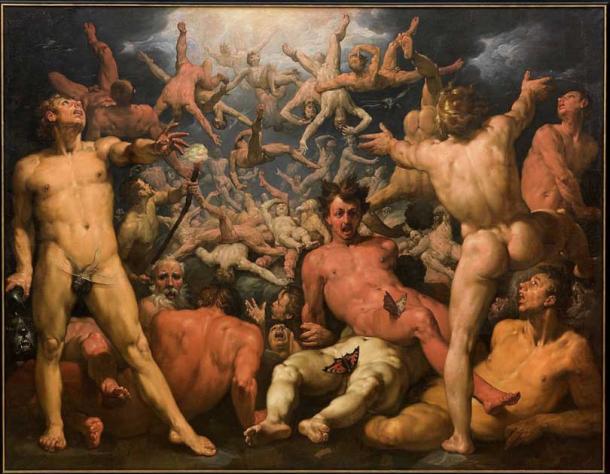
The Fall of the Titans, whereby the Greek god Zeus and his siblings overthrew his father Cronos and the other Titans, by Cornelis van Haarlem. (Public domain)
Zeus and the Olympians Overthrow the Titans
In any event, unbeknown to his father, Zeus grew up to be a formidable force and ultimately overthrew his father, becoming king of the gods. Having forced Cronus to free his other children from the depths of his stomach, the siblings joined forces against their father and the other Titans in an epic ten-year war remembered as the Titanomachy.
Zeus freed the Cyclopes, who ended up forging his iconic thunder and powerful lightning. After the battle, Zeus divided the world between himself and his older brothers, Hades and Poseidon, by drawing lots. Zeus became the ruler of the sky, remembered as the Sky Father, whilst Hades and Poseidon became the rulers of the underworld and the seas respectively.
Once in power, more violence followed. Angered by the way Zeus had treated his father, Gaia gave birth to the Giants. The battle that followed was known as the Gigantomachy. As with most Greek myths, the story had a moral. This time the Olympians were unable to defeat the giants without the help of a mortal, and Zeus had the perfect candidate in his son, the demigod Heracles.
Heracles famously battled against Alcyoneus, a giant whose immortality was dependent on him being in his homeland. The giant died when Heracles shot Alcyoneus with an arrow and dragged him out of the land of Phlegra. Alcyoneus was buried underneath Mount Vesuvius.
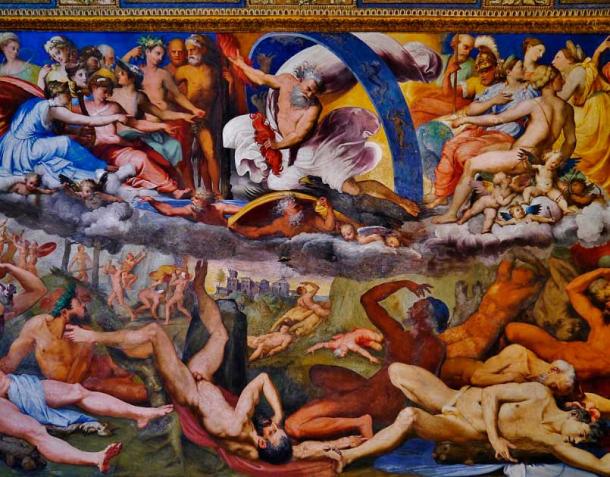
Fall of the Giants depicted on the ceiling of Duke's Villa, Genoa, in Italy. (Zairon / CC BY-SA 4.0)
The Greek God Zeus and His Many Conquests
Despite being the king of the Greek gods, Zeus was no angel. In fact, Zeus was the epitome of toxic masculinity, filling his story with many wives and even more sexual escapades. Adultery, pedophilia, rape and incest were part of his repertoire, as they were throughout the many mythological tales. Each of these acts were excused as part of his obligation to help populate the newly created world where women were seen as docile, and often willing, recipients of the attentions of Zeus.
In the legends associated with his name, Zeus raped many of the women featured in Greek myths, including Callisto, Antiope, Europa and Leda. In many of these stories Zeus transformed himself into the form of a variety of animals in order to do the deed, from a satyr, a swan or even a bull. In the story of Alcmene, Zeus turned himself into her long-lost husband in order to have his way with her. Their union produced the hero Heracles.
Zeus even raped his own mother Rhea when, during an ugly turn of events, she transformed into a snake to escape him and he raped her anyway. The child born of this familial assault was Persephone. Throughout the stories of Zeus, there are dozens of sexual encounters recorded, “each possibly a marginalizing of a goddess worshipped before the invasion of the Indo-Europeans,” according to Project Orpheus.
It seems that Zeus would do anything to satisfy his lustful urges. Danae was impregnated by Zeus taking the form of a golden shower. After hearing a prophecy that told of his death at the hand of his child, Acrisius locked his daughter Danae in a steel underground chamber. Attracted by her beauty, Zeus decided to visit her disguised as golden rain, which fell through the only window into her womb and left her pregnant.
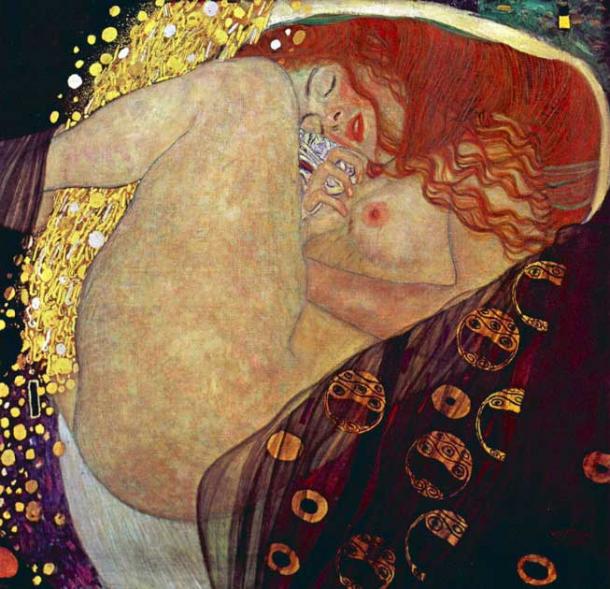
The story of Danaë and the golden rain, depicted by Gustav Klimt. (Public domain)
In one particularly traumatic story, Zeus fell in love with a young Trojan boy named Ganymede. According to the myth, Zeus kidnapped the boy and took him to Mount Olympus to serve as a cupbearer. It was claimed that Zeus shape shifted into an eagle in order to take the boy, who was then made immortal in order to serve the carnal needs to the gods for eternity.
The story of the rape of Ganymede was recounted not only in the Iliad, but also in works by Ovid, Virgil and Hesiod, amongst others. Several artists inspired by the story have depicted the rape of Ganymede with an eagle kidnapping the child. According to the Homeric Hymn to Aphrodite:
“Zeus carried off golden-haired Ganymedes because of his beauty, to be amongst the Deathless Ones and pour drink for the gods in the house of Zeus–a wonder to see–, honored by all the immortals as he draws the red nectar from the golden bowl.”
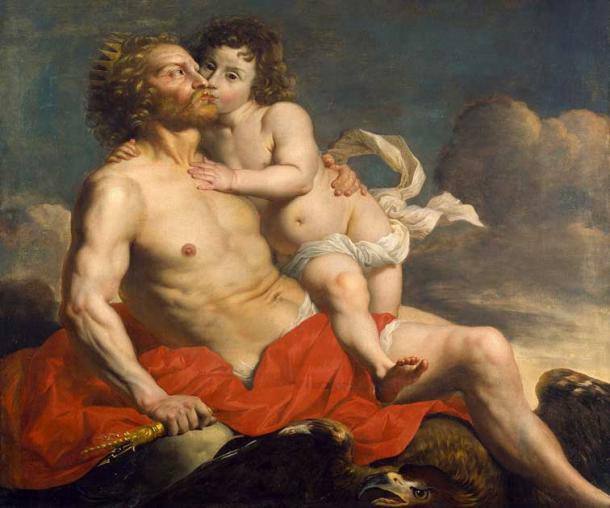
Jupiter (or Zeus) and Ganymede, by Nicolaes de Helt Stockade.(Public domain)
Zeus’ Children: The Many Offspring of the Greek God
Throughout Greek mythology, the sexual exploits of the king of the gods with both mortals and goddesses, led to the birth a multitude of children. Alcmene gave both to Heracles, Europa gave birth to Minos, while Leto became mother to Artemis and Apollo.
According to one myth, Zeus’ first wife was Metis, an Oceanid who would later become equated with wisdom and cunning. It was prophesized that the son produced by Zeus and Metis would one day overthrow his father. Therefore, the king of the gods devised a plan to avoid the fate that had befallen Cronus. When Metis was pregnant, Zeus tricked and swallowed her. Because of this, the goddess Athena grew up in Zeus’ belly, and subsequently emerged fully armed from his head.
Apart from Metis, Zeus had children with numerous other goddesses and mortal women. With his next wife, Hera, for instance, Zeus sired Ares, Hebe, and Eileithyia. Zeus is also regarded as the father of Artemis and Apollo, whose mother, Leto, was Zeus’ cousin.
Zeus had many affairs with mortal women as well, thus producing a myriad of demi-gods - the most famous of whom include the heroes Heracles and Perseus, Minos (the first king of Crete), and Helen of Troy, the most beautiful woman in the world according to Greek mythology.
The Collector explains that “some estimate Zeus might have had around 92 different children.” Of these, many were divine, resulting from copulation between Zeus and the many goddesses of his realm. Amongst these were Aphrodite, the goddess of love, Persephone, the goddess of spring and Athena, the goddess of war. His sons included Apollo, the ancient Greek god of the sun, music and light, Hermes, the messenger of the gods, Dionysus, god of wine, and Ares the god of war.
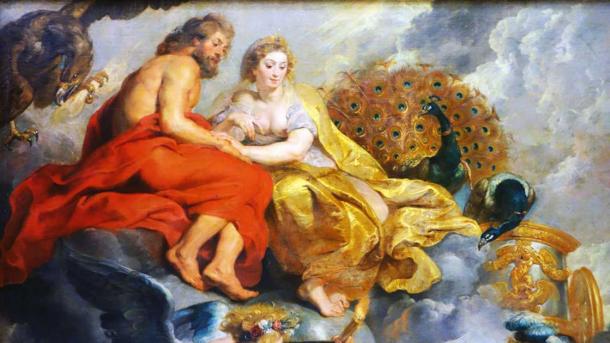
Portrait of Zeus and Hera by Rubens. (Steven Zucker / CC BY NC SA 2.0)
Zeus and Hera: A Match Made in Heaven?
Despite his string of lovers and wives, the best remembered of his wives was Hera, the wrathful Greek goddess of marriage. Like the many women in his life, Zeus tricked Hera into marrying him. This time he took on the form of a cuckoo, at least in some versions of the story. Despite being the goddess of marriage, her own union was a troublesome affair thanks to his lack of fidelity.
His frequent escapades inspired jealous outbursts and spiteful revenge against his unwitting victims. So extreme was her behavior, that she became responsible for the descent of Heracles, the demi-god son of Zeus and Alcmene, into madness and his subsequent murder of his own children.
On discovering an affair between Zeus and the forest nymph Echo, Hera cursed Echo with only being able to repeat the words spoken to her. When Zeus fell in love with Callisto, Hera turned her into a bear.
Temples and Monuments to the Greek God Zeus
As the supreme deity of the Greek pantheon, many temples were built in honor of Zeus. The most important of these was the Temple of Zeus at Olympia. This was one of the seven wonders of the ancient world, and was renowned for its colossal gold and ivory statue of the god made by the famed sculptor Pheidias. Other well-known sites sacred to Zeus include Dodona, where the god had an oracle, Mount Lykaion, and several caves on Crete.
As king of the Greek gods, Zeus and his Roman equivalent Jupiter, have been depicted throughout history. In most portrayals Zeus was shown as a strong, muscular man who sported a healthy beard. Often he is shown holding a lightning bolt in his right hand. Besides the lightning bolt, he has also been depicted with a royal scepter, associated with the eagle, and even as a bull, in a throwback to the mythical tale of when he raped Europa disguised as a bull. In many artworks he is seen sitting on his throne.
The Altar of Zeus at Pergamon, built under Eumenes II during the second century BC, was once part of the Pergamon acropolis in modern-day Turkey and can now be visited in Berlin. These stunning reliefs include representations of the Gigantomachy, whose realistic carvings represent the fabled battle between the Giants and the Olympian gods in what has come to be a well loved example of Hellenistic sculpture visited by hundreds of thousands of people every year.
Top image: Zeus, Greek god of Mount Olympus, Source: matiasdelcarmine / Adobe Stock
By Wu Mingren
References
Atsma, A. J., 2017. Zeus. Available at: http://www.theoi.com/Olympios/Zeus.html
No name. 2014. “Zeus” in Greek Gods & Goddesses. Available at: https://greekgodsandgoddesses.net/gods/zeus/
Hesiod, T. [West, M. L. (trans.). 1988. Hesiod’s Theogony and Works and Days. Oxford: Oxford University Press.
Karas, M. & Megas, C. 2017. “Zeus” in Greek Mythology. Available at: https://www.greekmythology.com/Olympians/Zeus/zeus.html
Leadbetter, R. 2005. “Zeus” in Pantheon. Available at: http://www.pantheon.org/articles/z/zeus.html


















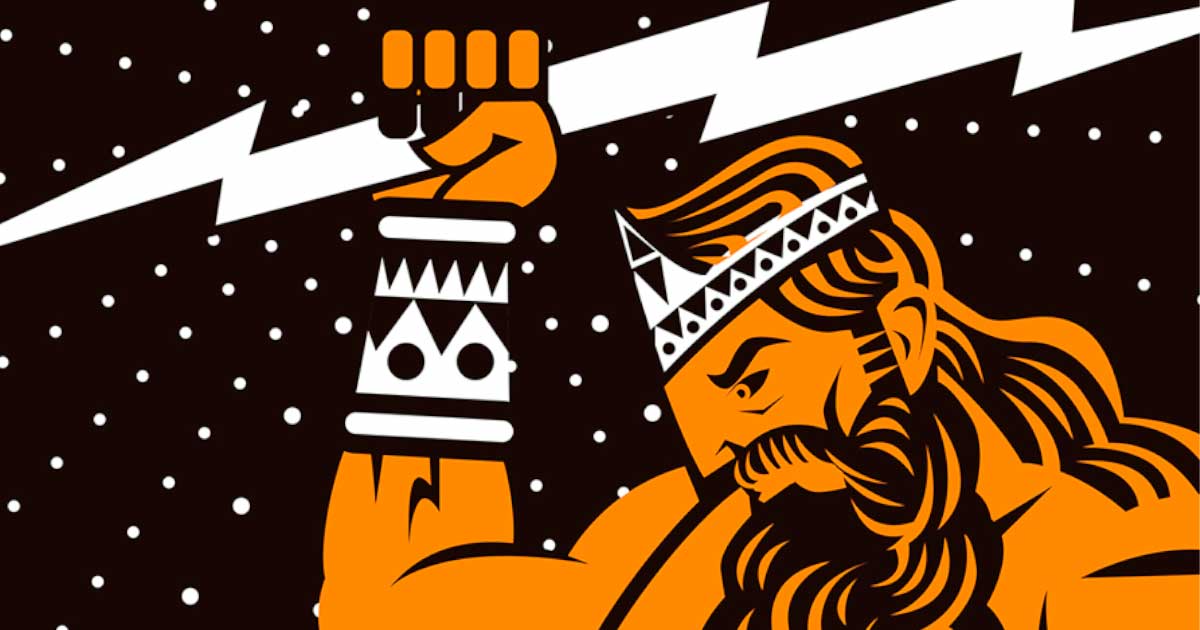

Comments
Hi All,
So all I'm going to say pertaining too This discussions Subject at hand zeus.
I no longer believe they are Myth's in fact my continual study of specific Books from The Ancient World of our Distant Ancestor's
Helps me to understand the World Before The Great Flood.
I'm thankful (since this is how I believe, I'm aware not all agree), to God leading me to The Prophet of Old Enoch's writing's.
I know there really was A Atlas & in Hebrew he is SATAL a Fallen Angel out of 200 Watcher's.
I'm sure that SATAL's brother Baraqiel which in Hebrew translates too Lightening Giver was of the family Clan Baal look at Baraquiel's name single B plus 2 A's followed by L.
At least one of them problem inherited by their Watcher Father was known as a Weather deity strangely married to an ashera or asheroth.
If it helps baal battle the Leviathan while Apollo/Thor battled the Midgard Snake the bringer of the Apocalypse and twilight of the gods.
It is possible the Apocalypse in Ragnorak is referring to The Great Flood because partial reveal of Ragnarok is that Life Goes on just Not with Any of Them.
For the rainbow Bridge to close tells me All Entrances, Exits, Passageways & Portals into The Heaven's were permanently sealed such was the wrath of God's Anger towards those 200 Watcher's which is why they are imprisoned in Hell for their Crimes they committed against Creation.
There's no doubt there were most likely other fallen Angel's and their children that meddled with the weather which is why in so many different languages & cultures there are many weather deities either still being worshipped now as they were worshipped then.
Getting back too Zeus primal based appetites especially Lust Desire & Want Enoch does mention that those Angel's and their children had raging Appetites that could not be controlled so it makes sense how crazed Zeus was with his lust they were all like that no boundaries.
This is my spin on the Topic of Zeus and his crazed womanizing ways why does know one ever bother saying the R word when describing Zeus? He was a Rapist, A serial rapist's.
How is it all that's written about this thing Zeus that conversation never come's up in any article about the Ancient World?
That's all I have to say about this Subject matter regarding Zeus.
So until next discussion Everyone Goodbye!
Hi All,
So all I'm going to say pertaining too This discussions Subject at hand zeus.
I no longer believe they are Myth's in fact my continual study of specific Books from The Ancient World of our Distant Ancestor's
Helps me to understand the World Before The Great Flood.
I'm thankful (since this is how I believe, I'm aware not all agree), to God leading me to The Prophet of Old Enoch's writing's.
I know there really was A Atlas & in Hebrew he is SATAL a Fallen Angel out of 200 Watcher's.
I'm sure that SATAL's brother Baraqiel which in Hebrew translates too Lightening Giver was of the family Clan Baal look at Baraquiel's name single B plus 2 A's followed by L.
At least one of them problem inherited by their Watcher Father was known as a Weather deity strangely married to an ashera or asheroth.
If it helps baal battle the Leviathan while Apollo/Thor battled the Midgard Snake the bringer of the Apocalypse and twilight of the gods.
It is possible the Apocalypse in Ragnorak is referring to The Great Flood because partial reveal of Ragnarok is that Life Goes on just Not with Any of Them.
For the rainbow Bridge to close tells me All Entrances, Exits, Passageways & Portals into The Heaven's were permanently sealed such was the wrath of God's Anger towards those 200 Watcher's which is why they are imprisoned in Hell for their Crimes they committed against Creation.
There's no doubt there were most likely other fallen Angel's and their children that meddled with the weather which is why in so many different languages & cultures there are many weather deities either still being worshipped now as they were worshipped then.
Getting back too Zeus primal based appetites especially Lust Desire & Want Enoch does mention that those Angel's and their children had raging Appetites that could not be controlled so it makes sense how crazed Zeus was with his lust they were all like that no boundaries.
This is my spin on the Topic of Zeus and his crazed womanizing ways why does know one ever bother saying the R word when describing Zeus? He was a Rapist, A serial rapist's.
How is it all that's written about this thing Zeus that conversation never come's up in any article about the Ancient World?
That's all I have to say about this Subject matter regarding Zeus.
So until next discussion Everyone Goodbye!
A 100% Astrological story.